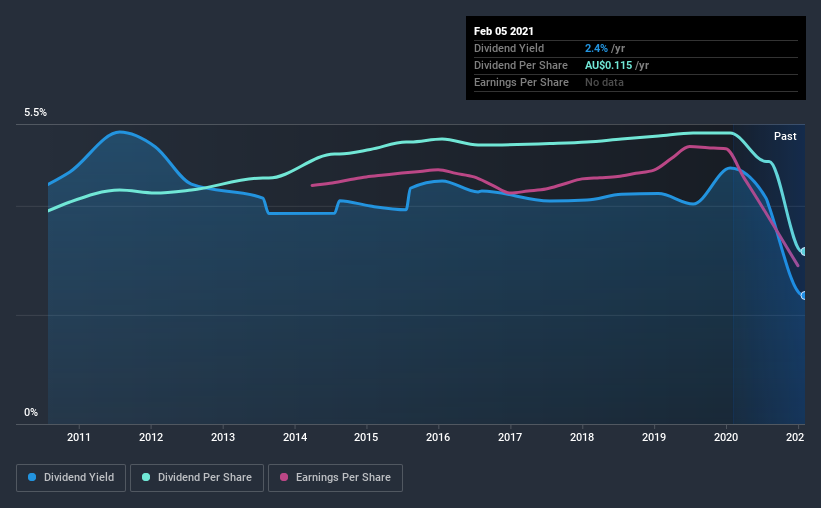It Might Not Be A Great Idea To Buy Milton Corporation Limited (ASX:MLT) For Its Next Dividend
Readers hoping to buy Milton Corporation Limited (ASX:MLT) for its dividend will need to make their move shortly, as the stock is about to trade ex-dividend. This means that investors who purchase shares on or after the 10th of February will not receive the dividend, which will be paid on the 4th of March.
Milton's next dividend payment will be AU$0.058 per share, and in the last 12 months, the company paid a total of AU$0.12 per share. Looking at the last 12 months of distributions, Milton has a trailing yield of approximately 2.4% on its current stock price of A$4.88. If you buy this business for its dividend, you should have an idea of whether Milton's dividend is reliable and sustainable. So we need to check whether the dividend payments are covered, and if earnings are growing.
See our latest analysis for Milton
If a company pays out more in dividends than it earned, then the dividend might become unsustainable - hardly an ideal situation. Milton paid out 112% of profit in the past year, which we think is typically not sustainable unless there are mitigating characteristics such as unusually strong cash flow or a large cash balance.
When the dividend payout ratio is high, as it is in this case, the dividend is usually at greater risk of being cut in the future.
Click here to see how much of its profit Milton paid out over the last 12 months.
Have Earnings And Dividends Been Growing?
Companies with falling earnings are riskier for dividend shareholders. If earnings decline and the company is forced to cut its dividend, investors could watch the value of their investment go up in smoke. Readers will understand then, why we're concerned to see Milton's earnings per share have dropped 8.8% a year over the past five years. Ultimately, when earnings per share decline, the size of the pie from which dividends can be paid, shrinks.
Another key way to measure a company's dividend prospects is by measuring its historical rate of dividend growth. Milton's dividend payments per share have declined at 2.1% per year on average over the past 10 years, which is uninspiring. While it's not great that earnings and dividends per share have fallen in recent years, we're encouraged by the fact that management has trimmed the dividend rather than risk over-committing the company in a risky attempt to maintain yields to shareholders.
The Bottom Line
Is Milton an attractive dividend stock, or better left on the shelf? Earnings per share are in decline and Milton is paying out what we feel is an uncomfortably high percentage of its profit as dividends. Generally we think dividend investors should avoid businesses in this situation, as high payout ratios and declining earnings can lead to the dividend being cut. This is not an overtly appealing combination of characteristics, and we're just not that interested in this company's dividend.
So if you're still interested in Milton despite it's poor dividend qualities, you should be well informed on some of the risks facing this stock. To help with this, we've discovered 2 warning signs for Milton (1 is a bit concerning!) that you ought to be aware of before buying the shares.
A common investment mistake is buying the first interesting stock you see. Here you can find a list of promising dividend stocks with a greater than 2% yield and an upcoming dividend.
This article by Simply Wall St is general in nature. It does not constitute a recommendation to buy or sell any stock, and does not take account of your objectives, or your financial situation. We aim to bring you long-term focused analysis driven by fundamental data. Note that our analysis may not factor in the latest price-sensitive company announcements or qualitative material. Simply Wall St has no position in any stocks mentioned.
Have feedback on this article? Concerned about the content? Get in touch with us directly. Alternatively, email editorial-team (at) simplywallst.com.

 Yahoo Finance
Yahoo Finance 
